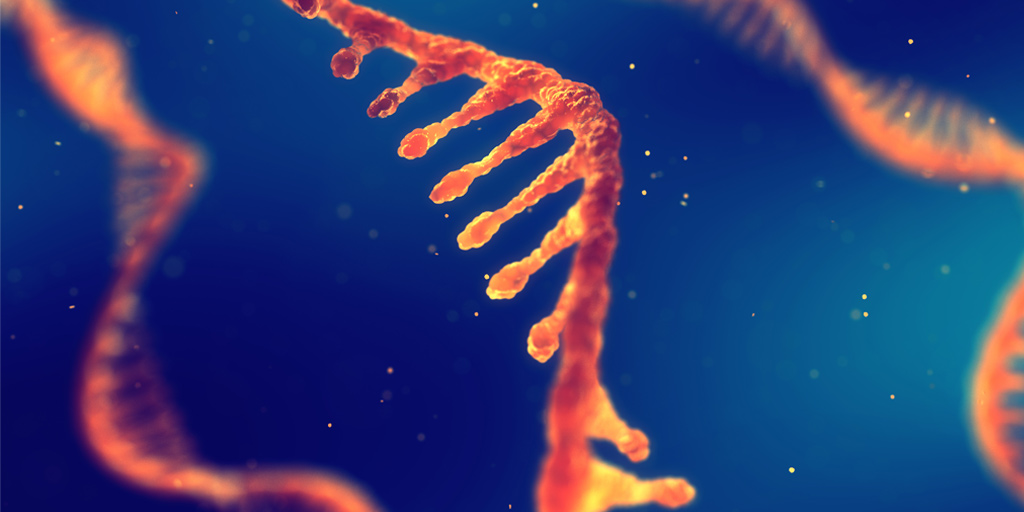
A protein first purified and sold by Promega almost four decades ago has emerged as a crucial tool in many COVID-19 testing workflows. RNasin® Ribonuclease Inhibitor was first released in 1982, only four years after the company was started. At that time, the entire Promega catalog fit on a single sheet of 8.5 × 11” paper, and RNasin was one of the first products to draw widespread attention to Promega. Today, the demand for this foundational product has skyrocketed as it supports labs responding to the COVID-19 pandemic.
What is RNasin® Ribonuclease Inhibitor?
RNA is notoriously vulnerable to contamination by RNases. These enzymes degrade RNA by breaking the phosphodiester bonds forming the backbone of the molecule. To say that RNases are everywhere is barely an exaggeration – almost every known organism produces some form of RNase, and they’re commonly found in all kinds of biological samples. They’re easily introduced into experimental systems, since even human skin secretes a form of RNase. Once they’re present, it’s very hard to get rid of them. Even an autoclave can’t inactivate RNases; the enzymes will refold and retain much of their original activity.
RNasin® Ribonuclease Inhibitor is a protein that has been shown to inhibit many common contaminating RNases, but without disrupting the activity of enzymes like reverse transcriptase that may be essential to an experiment. It works by binding to the RNase enzyme, prevent it from acting on RNA molecules. This is important for ensuring that RNA samples are intact before performing a complex assay.
RNasin® Ribonuclease Inhibitor was first released by Promega in 1982. According to several long-time employees, Promega founder and CEO Bill Linton had a hands-on role in developing the original purification methods. Native RNasin protein is found in human placenta, so Promega worked with hospitals in Madison, WI to isolate RNasin from placentas. Eventually, demand rose to the point where new production methods were needed. Recombinant RNasin (rRNasin) was developed by engineering E. coli to produce the protein, which can then be purified. rRNasin was released in 1992.
Since its introduction in 1982, RNasin® Ribonuclease Inhibitor from Promega has been cited in over 30,000 journal articles.
RNasin® in COVID-19 Testing
At this time, there are two main methods for COVID-19 testing. Antibody tests, which are relatively new, detect antibodies in blood samples and account for a smaller portion of tests. The vast majority of daily tests are performed using Reverse Transcription Polymerase Chain Reaction, or RT-PCR, which detects the presence of viral RNA in an active COVID-19 infection.
To detect COVID-19 using PCR-based methods, a sample is first swabbed from deep in the patient’s nasal cavity. RNA is extracted from the sample, and the resulting nucleic acids are used for RT-PCR. If RNases are present in the sample at any point in the workflow, the RNA can be degraded, ruining the test. RNasin can be used to protect the RNA from RNase degradation, helping patients and clinicians get important answers about infection status.
In the past 3 months, Promega has manufactured and distributed 20 years’ worth of RNasin. Several kits with Emergency Use Authorization from the FDA include RNasin, including the Simplexa™ COVID-19 Direct kit by DiaSorin Molecular LLC.
“When developing IVD assays to detect RNA targets, RNase inhibitors are vital to achieve reliable detection at low copy numbers when performing Reverse Transcription Real-Time PCR,” said Michelle Tabb, PhD, Chief Scientific Officer of Diasorin Molecular. “It is critical to use an RNAse inhibitor that does not inhibit reverse transcriptase and DNA polymerase activity and performs consistently like RNasin from Promega.”
As scientists continue to work through challenges presented by the COVID-19 pandemic, Promega remains committed to meeting customer needs, including this product that has been instrumental for almost 40 years.
Latest posts by Jordan Villanueva (see all)
- Tackling Undrugged Proteins with the Promega Academic Access Program - March 4, 2025
- Academic Access to Cutting-Edge Tools Fuels Macular Degeneration Discovery - December 3, 2024
- Novel Promega Enzyme Tackles Biggest Challenge in DNA Forensics - November 7, 2024
